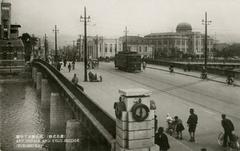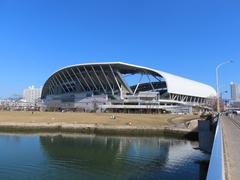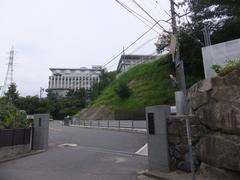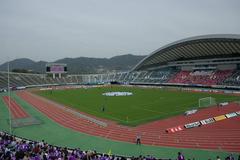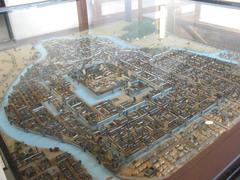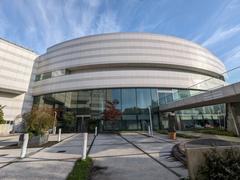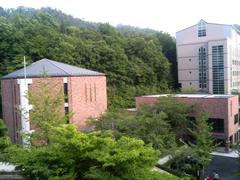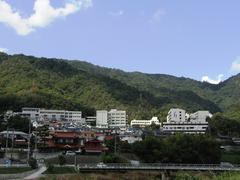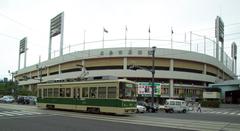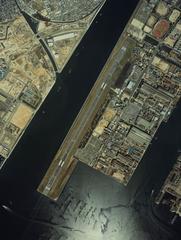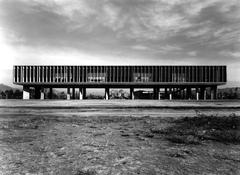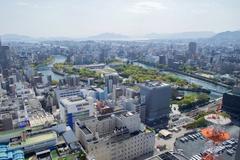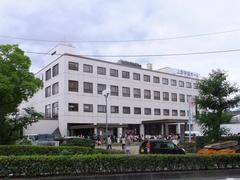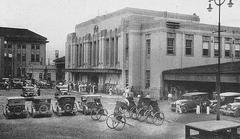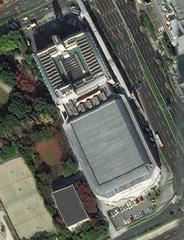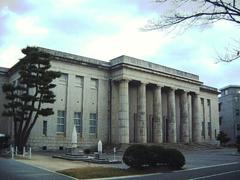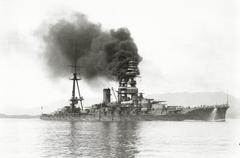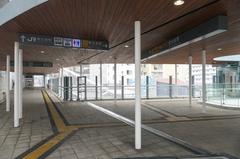Furuichi Station Hiroshima: Visiting Hours, Tickets, and Comprehensive Travel Guide
Date: 04/07/2025
Introduction
Furuichi Station in Hiroshima, Japan, serves as a key gateway for travelers eager to discover the city’s rich cultural heritage and historical landmarks. Located on both the Astram Line and JR West’s Kabe Line, Furuichi Station provides extensive connectivity to Hiroshima’s most significant sites, including the Hiroshima Peace Memorial Park, Hiroshima Castle, and Shukkeien Garden. Whether you’re a local commuter or an international visitor, understanding Furuichi Station’s visiting hours, ticketing options, accessibility features, and nearby attractions will ensure a seamless and memorable trip.
Conceived in the late 1980s to accommodate Hiroshima’s urban expansion and major events like the 1994 Asian Games, the Astram Line is a modern Automated Guideway Transit system that integrates seamlessly with the city’s broader transport network, including streetcars and JR trains (Transport Wiki; MHI News). Furuichi Station itself operates daily from early morning until midnight, offering multilingual ticket machines, barrier-free access, and clear signage to support all visitors, including those with mobility needs (JR West Guide).
Located in the vibrant Asaminami Ward, Furuichi Station also provides easy access to Hiroshima’s culinary scene, local festivals, and special events, immersing visitors in the city’s spirit of peace and resilience (explorecity.life; matcha-jp.com). From Furuichi, it’s a short ride to iconic sites like the Peace Memorial Park, connecting you with the landmarks and museums that tell Hiroshima’s compelling story (Hiroshima Peace Memorial Museum).
This guide compiles everything you need to know about Furuichi Station’s operations, ticketing, accessibility, and travel tips—ensuring your journey to Hiroshima’s cultural heart is both meaningful and hassle-free.
Table of Contents
- Introduction
- Historical Development of Furuichi Station and the Astram Line
- Station Layout, Facilities, and Accessibility
- Ticketing Services and Visiting Hours
- Nearby Attractions and Travel Tips
- Hiroshima Peace Memorial Park: Hours, Tickets, and Access
- Cultural and Social Significance of Furuichi Station
- Practical Visitor Information
- Frequently Asked Questions (FAQs)
- Visuals and Interactive Elements
- Conclusion and Call to Action
- Summary and Travel Recommendations
- Sources
Historical Development of Furuichi Station and the Astram Line
Origins and Evolution
The Astram Line was developed in the late 1980s as Hiroshima anticipated significant urban growth and the influx of visitors for the 1994 Asian Games. Construction began in 1987, and the line opened in August 1994 (Transport Wiki; MHI News). Stretching 18.4 km with 22 stations, the Astram Line connects central Hiroshima (Hondori Station) to the city’s northwest (Koiki-koen-mae Station), combining underground, elevated, and ground-level sections.
Furuichi Station is a crucial mid-line stop, serving both residential and commercial districts, and acts as a convenient transfer point on the line. Recent expansions, such as the addition of Shin-Hakushima Station, further improved connectivity with JR lines.
Modern Features
The Astram Line’s rubber-tired trains ensure a quiet, comfortable ride. Furuichi Station’s design prioritizes barrier-free access, with elevators, wide gates, and multilingual signage. Trains run at intervals as short as 2 minutes and 30 seconds during peak times, supporting smooth passenger flow (Transport Wiki).
Station Layout, Facilities, and Accessibility
Layout and Access
Furuichi Station features an island platform serving two tracks, allowing easy boarding in both directions. Access is via a pedestrian overpass, with bilingual signage throughout.
Ticket Gates and Services
Automated ticket gates support IC cards (ICOCA, Suica, PASMO) and paper tickets. Dedicated gates and wide aisles accommodate travelers with disabilities. The main entrance on the south side hosts ticket machines (with English support) and a staffed ticket office during peak hours.
Amenities
- Waiting Areas: Comfortable indoor rooms and sheltered platform seating.
- Restrooms: Clean, Western-style, accessible, and equipped with baby-changing facilities.
- Storage: Coin lockers are available for luggage.
- Retail: Kiosks and vending machines offer snacks and travel essentials.
- Security: Surveillance cameras, AEDs, and emergency call buttons. A small police presence ensures safety.
- Connectivity: Free public Wi-Fi and charging stations.
Accessibility
Furuichi Station is fully accessible, featuring elevators, ramps, tactile paving, and wide gates. Staff assistance is available on request, and announcements are made in both Japanese and English.
Ticketing Services and Visiting Hours
- Operating Hours: Daily from 5:00 AM to midnight.
- Ticket Options: Single-journey tickets, commuter passes, and cost-effective 1-Day Tickets (900 yen adults, 450 yen children) for unlimited Astram Line rides (Transport Wiki). Machines accept cash and major cards.
- Passes: Hiroshima Tourist Passes and Meipuru-pu Loop Bus tickets are also available nearby (matcha-jp.com; jprail.com).
Nearby Attractions and Travel Tips
- Historical Sites: Reach Hiroshima Peace Memorial Park, Atomic Bomb Dome, Hiroshima Castle, and Shukkeien Garden efficiently via the Astram Line and connecting services.
- Dining: Enjoy Hiroshima-style okonomiyaki and other local specialties in nearby restaurants (matcha-jp.com).
- Events: Seasonal festivals (like the Hiroshima Flower Festival) and occasional station-hosted events offer insight into local culture (explorecity.life).
- Photography: The station’s architecture and surrounding nature are particularly scenic in cherry blossom season and autumn.
- Transport Integration: Furuichi is well connected to buses, the JR Kabe Line, and the wider Astram Line, making day trips (e.g., to Miyajima Island) convenient.
Hiroshima Peace Memorial Park: Hours, Tickets, and Access
Overview
Hiroshima Peace Memorial Park is a UNESCO World Heritage Site dedicated to the victims of the atomic bombing. Central features include the A-Bomb Dome, Peace Memorial Museum, Cenotaph, and Children’s Peace Monument (Hiroshima Peace Memorial Museum).
Visiting Information
- Park Hours: Open 24/7 for outdoor monuments.
- Museum Hours: 8:30 AM–6:00 PM (last entry 5:30 PM; extended hours in peak seasons).
- Admission: Park access is free; Museum entry is 200 JPY (adults), 100 JPY (students), free for children.
- Guided Tours: Offered in multiple languages; book via the museum’s website.
Access from Furuichi Station
- Take the Astram Line south to Hondori Station (approx. 20 minutes).
- Walk or take a streetcar to the park entrance.
Tips
- Visit early or late for fewer crowds and softer light.
- The park is wheelchair-friendly.
- Cafes and souvenir shops are nearby.
Cultural and Social Significance of Furuichi Station
Community and History
Furuichi Station is embedded in Hiroshima’s post-war narrative of peace and resilience. Its vicinity boasts a diverse, welcoming community, reflected in the city’s inclusive cuisine and cultural offerings (explorecity.life). Annual festivals and arts events, such as the Hiroshima Flower Festival and International Animation Festival, are easily accessible from the station.
Local Life
The area around Furuichi exemplifies Hiroshima’s blend of tradition and modernity. Regional cuisine, international eateries, and community-driven initiatives define local life. The station’s safety and hospitality make it ideal for visitors (travellersworldwide.com).
Practical Visitor Information
- Ticket Purchases: Use multilingual machines or staffed counters. The Hiroshima Tourist Pass and Meipuru-pu Loop Bus pass are recommended for sightseeing.
- Transit Navigation: Clear signage in English/Japanese; the Meipuru-pu Loop Bus links the station to all major attractions (jprail.com).
- Climate: Summers are hot and humid, and June is the wettest month. Bring an umbrella.
- Connectivity: Free Wi-Fi at major stations; consider a pocket Wi-Fi or local SIM card (herethereandgone.com).
- Day Trips: Miyajima Island, Onomichi, and Kure are popular excursions (matcha-jp.com).
Frequently Asked Questions (FAQs)
Q: What are Furuichi Station’s operating hours?
A: 5:00 AM to midnight daily.
Q: Can I use IC cards like ICOCA or Suica at Furuichi Station?
A: Yes, IC cards are accepted.
Q: Is the station accessible for travelers with disabilities?
A: Yes, with elevators, ramps, tactile paving, and wide gates.
Q: What are the ticketing options for tourists?
A: 1-Day Astram Line tickets, Hiroshima Tourist Passes, and Meipuru-pu Loop Bus passes are available.
Q: How do I get to Hiroshima Peace Memorial Park?
A: Take the Astram Line to Hondori Station, then walk or use the streetcar.
Visuals and Interactive Elements
Explore virtual tours and interactive maps of Furuichi Station and Hiroshima’s historical sites via official tourism platforms. Images with descriptive alt tags—for example, “Furuichi Station entrance during cherry blossom season”—assist all users and improve search visibility.
Conclusion and Call to Action
Furuichi Station is more than a transit point—it’s a gateway to Hiroshima’s cultural legacy and community life. With its strategic location, accessible facilities, and comprehensive ticketing, it makes exploring the city’s history, festivals, and cuisine easy and enjoyable.
For real-time schedules, detailed maps, and insider tips, download the Audiala app and follow our channels for the latest updates. Let Furuichi Station be your starting point to a memorable Hiroshima adventure!
Summary and Travel Recommendations
Furuichi Station’s modern amenities, accessibility, and integration with Hiroshima’s transit network make it the ideal starting point for exploring the city’s historical and cultural highlights. Travelers should plan visits within operating hours, leverage ticket passes for savings, and take advantage of the station’s accessibility features. Seasonal photography, guided tours, and local events further enrich your Hiroshima experience. For up-to-date information, consult official resources like the Astram Line website, Hiroshima Peace Memorial Museum, and JR West Guide.
Sources and Further Reading
- Astram Line Hiroshima, 2024, Transport Wiki
- MHI Delivers Final 7000-Series AGT Trainset for the Astram Line, 2025, MHI News
- Furuichi Station Visiting Hours, Tickets, and Accessibility Guide, 2024, JR West
- Exploring Hiroshima, 2024, ExploreCity Life
- Hiroshima Travel Guide, 2024, Matcha Japan
- Hiroshima Peace Memorial Museum Official Site, 2024
- Is Hiroshima Safe to Visit?, 2024, Travellers Worldwide
- Hiroshima Station Guide & Transit Tips, 2024, JP Rail
